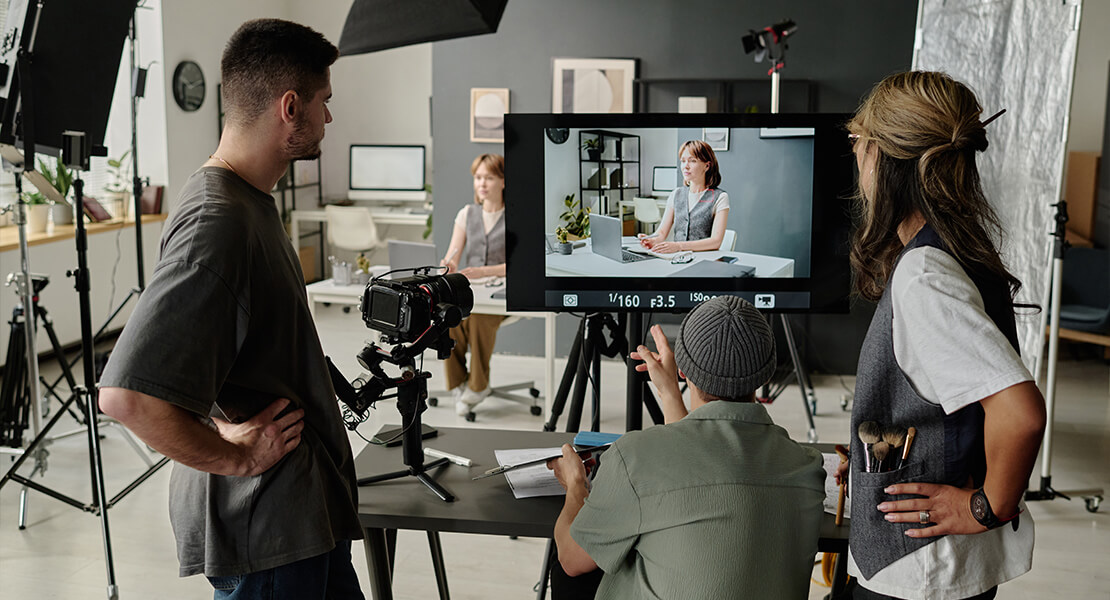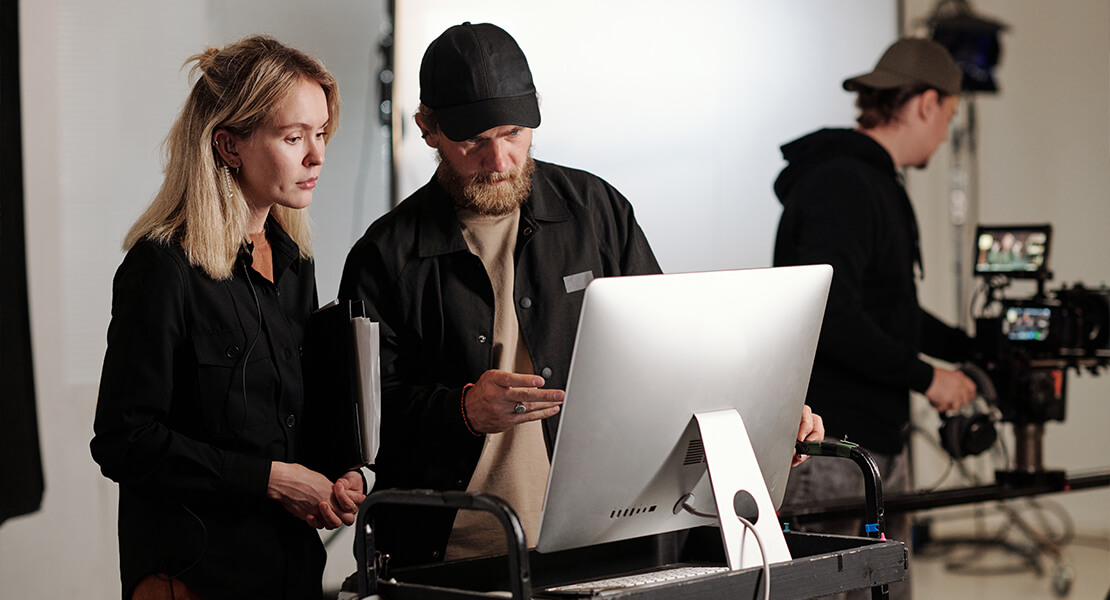
If you’re thinking about building a career in video production—or levelling up your current one—you’ll need more than just a camera and editing software. The industry today is fast-paced, competitive, and full of opportunities for those who are well-rounded and skilled across the board. It’s no longer enough to be good at just one thing.
Clients and employers are looking for professionals who can bring creative ideas to life, solve technical problems on the fly, and collaborate with others under tight deadlines. In this guide, we’ll break down the essential skills that truly matter in modern video production. Whether you’re a freelancer, agency team member or aspiring director, these are the capabilities that will set you apart and keep you in demand.
1. Mastery of Camera Operations and Gear
Understanding how to operate a camera is the foundation of any video production role. But it goes beyond knowing where the record button is. You should be confident with framing, exposure, focus pulling, white balance, and lenses. Different cameras suit different jobs—DSLRs, mirrorless, cinema cameras, action cams—and knowing when and how to use each one is key.
Employers want someone who can adapt to various filming environments, from studio shoots to handheld documentary-style setups. You should also be comfortable setting up and handling supporting gear like gimbals, tripods, sliders and drones. In short, being the person who knows how to get the shot, no matter the scenario, makes you invaluable on set.
2. Lighting Techniques That Make the Shot Pop
Lighting is one of the most underestimated yet powerful elements in production. Whether you’re working with natural daylight, LED panels or full-on studio lighting setups, knowing how to shape light to create mood and clarity is crucial. This includes three-point lighting, soft vs hard light, colour temperature matching, and using modifiers like reflectors, softboxes, and flags.
You’ll also need to adapt your lighting for different skin tones, locations and purposes—like interviews, product videos, or cinematic storytelling. Many beginners overlook lighting because it seems technical, but mastering it is what separates amateur-looking footage from professional-grade visuals. Understanding how light behaves—and using it to complement your composition—can transform a basic shot into a compelling image.
3. Sound Recording and Audio Awareness

Great visuals fall flat without clear, high-quality audio. As a video production professional, you’ll need to understand how to capture clean sound using lavalier mics, shotgun mics, booms, or even audio recorders when filming remotely. This means knowing how to avoid common issues like background noise, mic rustle, echo, and distortion. You also need to think about your recording environment—hard surfaces, wind interference, or electrical hums can ruin a take. Clients notice when audio isn’t up to scratch, so having solid sound recording techniques is a mark of professionalism. You don’t have to be a full-blown sound engineer, but being proactive with your audio game will save time in post and boost the overall quality of your production.
4. Editing and Post-Production Skills
Once the shoot is done, the magic continues in post. Knowing your way around editing software like Adobe Premiere Pro, Final Cut Pro or DaVinci Resolve is non-negotiable. You should be able to cut footage with rhythm, tell a story through pacing, apply basic transitions, and sync sound with visuals seamlessly. Colour correction and grading—along with audio mixing and subtle effects—help shape the final tone and look of the video.
You’ll also benefit from understanding codecs, exports, and file delivery formats for different platforms. Clients often expect you to handle editing too, especially as a freelancer. The more refined and efficient you are in post, the more valuable you become.
5. Visual Storytelling and Narrative Sense
At its core, video production is about telling a story—whether you’re selling a product, documenting a wedding, or making a short film. You’ll need to know how to structure your visuals in a way that draws the viewer in and communicates the intended message. This means using your shots, sequences and pacing to create emotional impact. Think in terms of beginnings, middles and ends—even in a 30-second ad.
Understand how to match visuals with music, voiceover, or text overlays to guide the viewer’s attention and deliver a cohesive story. A strong narrative sense doesn’t just help with editing—it informs your decisions on set, too. It’s what turns a simple video into something people remember.
6. Creative Vision and Original Thinking
Beyond technical ability, what really makes your work stand out is your creativity. This is where your ability to pitch unique concepts, solve problems visually, and approach each project with fresh eyes comes in. Can you make a corporate video feel cinematic? Can you find an engaging way to shoot a talking head interview?
Creative thinking is what will make clients trust your judgement and give you more freedom on projects. It’s also what keeps your work fulfilling and dynamic. To nurture this, watch films, explore different genres, absorb visual trends, and push your boundaries with passion projects. The more you develop your creative voice, the more recognisable—and hireable—you become.

Video production can be chaotic—tight deadlines, multiple versions, and shifting feedback. That’s why being organised is a game-changer. You’ll need to manage pre-production schedules, coordinate with teams, track assets, and keep post-production timelines in check.
Naming conventions, backups, folder structures, and review platforms (like Frame.io or Vimeo Review) keep everyone on the same page. Employers and clients value someone who can deliver on time, with minimal hand-holding. Good time management also helps you stay sane, especially when juggling multiple projects. It’s not glamorous, but logistics make the creative work possible—and the smoother you are behind the scenes, the more trust you’ll earn on screen.
8. Communication and Collaboration
Video production is rarely a solo sport. Even if you’re a one-person crew, you’ll be dealing with clients, talent, assistants, or other creatives. Clear communication—from initial briefs to final edits—is vital. Can you interpret vague feedback? Can you give constructive direction to actors or explain your vision to a hesitant client?
Being a good collaborator means knowing when to listen, when to lead, and how to keep the atmosphere positive under pressure. It also helps when pitching ideas or negotiating budgets. Clients appreciate someone who can explain things in plain English and keep everyone calm when problems pop up. Good communication turns a skilled technician into a trusted partner.
9. Adaptability and Problem Solving
No matter how well you plan, things will go wrong. A battery dies, the weather turns, a file corrupts. Your ability to stay calm and find solutions on the spot is one of the most respected traits in this industry. Employers want problem-solvers, not complainers. Can you get the shot without a dolly? Can you reframe when the location suddenly changes?
Adaptability means thinking on your feet, using your tools in new ways, and staying flexible when plans shift. It also means keeping a cool head during post-production when feedback changes or timelines move. In this industry, your mindset is just as important as your gear.
10. Continuous Learning and Industry Awareness
Video production never stands still. New cameras, editing plugins, AI tools, and visual trends are emerging constantly. Staying relevant means being curious and committed to learning—whether through YouTube tutorials, industry events, online courses, or just trying new things. You’ll also benefit from understanding how different platforms like YouTube, TikTok, Instagram, or broadcast TV influence video formats, pacing, and resolution needs.
The professionals who thrive are the ones who evolve. Make time to sharpen your skills, explore new workflows, and keep your eye on where the industry is heading. Learning doesn’t stop when you land your first client—it’s what keeps your work competitive for years to come.
11. Understanding Branding and Marketing Basics
In today’s content-heavy world, many video production professionals work closely with brands and marketing teams. That means understanding the basics of branding—like tone of voice, visual identity, and customer targeting—can elevate the value you bring to a project.
Clients aren’t just paying for beautiful visuals; they want content that aligns with their message and performs well on the right platform. If you can interpret a creative brief, tailor content for different audiences, and suggest ideas that support campaign goals, you’ll quickly become a go-to partner.
This also applies to freelancers producing content for their own brands. Knowing how to promote your services with engaging social content, case studies, or behind-the-scenes footage can help you build visibility and trust. Ultimately, a producer who understands storytelling and strategy is far more valuable than one who simply follows instructions.
12. Multiplatform and Format Awareness
The days of producing one video for one platform are long gone. Today, clients expect deliverables optimised for everything from Instagram Reels to YouTube Shorts to LinkedIn promos. This means you need to be format-aware—thinking vertically for mobile, keeping key content in safe zones, and trimming long-form pieces into snackable versions. Understanding platform-specific nuances like TikTok’s trend-based algorithm or YouTube’s importance on retention rate can help you shape edits that perform better.
Delivering the same video across all channels no longer cuts it. If you can advise on repurposing content for multiple formats while maintaining a cohesive brand feel, you’ll be seen as both a creative and strategic asset—someone who understands not just how to make videos, but how to make them work.
13. Motion Graphics and Basic Animation
While not every video production professional needs to be a motion designer, having a basic grasp of motion graphics adds real value. Even simple animated text, lower thirds, logo stings or call-to-action graphics can elevate a project—especially for commercial or corporate clients.
Programmes like After Effects, Canva, or even motion features in Premiere can help you create polished, on-brand visuals that hold attention and improve clarity. Animated infographics or transitions can also break up talking-head-heavy videos and make them more dynamic.
If you can blend motion graphics with live footage and maintain visual consistency, you open yourself up to a wider range of jobs. It’s also a useful skill for working in social-first content, where eye-catching visuals matter most in the first few seconds.
14. Professionalism and Client Management
Finally, let’s talk about what keeps people hiring you again and again: professionalism. Being punctual, responsive, reliable, and clear in your communications makes all the difference. Delivering drafts on time, being upfront about delays, and keeping your promises builds trust.
When clients feel you’re invested in their project—not just showing up for a paycheck—they’re more likely to recommend you or return with more work. This also means being open to feedback, managing expectations, and handling revisions gracefully.
It’s easy to focus only on the creative and technical aspects of video production, but your attitude and approach are just as important. Great work might get you in the door, but professionalism is what builds a career.
15. Data-Driven Production Decisions

Modern video production isn’t just about creating content—it’s about creating content that works. That’s where data comes in. Understanding analytics can help you refine your approach, optimise performance, and prove your value to clients. Whether you’re measuring viewer retention on YouTube, engagement on social media, or conversions from a landing page video, the insights you gain from metrics can shape future projects.
This might involve tweaking lengths, testing thumbnails, or adjusting the call to action. Clients increasingly expect content that performs—not just looks good. Being able to read the data and respond with strategic creative choices gives you an edge that many production professionals overlook.
16. Ethics and Responsible Storytelling
As video producers, we hold the power to shape perceptions, tell impactful stories, and influence audiences. With that power comes responsibility. Ethical video production involves respecting the people you feature, being transparent with clients, and avoiding manipulation in editing. It also means being aware of issues like representation, diversity, consent, and environmental sustainability in your work.
Clients increasingly value socially conscious creatives who understand the wider impact of the stories they tell. By embedding ethical considerations into your workflow, you not only protect your reputation—you contribute to a healthier, more inclusive industry that values people as much as pixels.
17. Building a Sustainable Freelance Business
Many professionals in video production operate as freelancers, which comes with its own set of skills. Beyond shooting and editing, you’ll need to manage your business—handling contracts, invoicing, taxes, and client communication.
A sustainable freelance career means building systems that support your workflow, pricing your services competitively yet profitably, and managing downtime or slow periods strategically. You’ll also want to market yourself consistently, using a strong portfolio, social media presence, and word-of-mouth referrals.
Networking becomes crucial—not just for finding work, but for learning from peers and staying motivated. Success as a freelancer often depends not just on your talent, but on your ability to run your career like a business.
18. Embracing Emerging Technologies
The future of video production is being shaped by emerging technologies like virtual production, 360-degree video, volumetric capture, and AI-assisted editing. While you don’t need to master every new tool, being open to learning and experimenting with innovative technologies can help futureproof your skills.
Understanding how real-time engines like Unreal Engine integrate with live-action shoots, or how AI tools can automate tedious post-production tasks, can set you apart in a crowded field. Staying tech-savvy shows clients you’re invested in efficiency and innovation. As boundaries between disciplines blur, those who embrace change—rather than fear it—will lead the way in shaping the next generation of storytelling.
Final Words: Crafting a Career That Stands Out
Success in video production isn’t just about having flashy gear or a slick showreel. It’s about showing up with a full toolkit of technical know-how, creative flair, and interpersonal skills that make you a joy to work with.
By mastering these essential abilities, you’ll not only create work that looks and sounds great—you’ll build a reputation that leads to repeat clients, exciting projects, and long-term career growth. So whether you’re just starting out or levelling up your current game, invest in these skills.
The industry is wide open for those who can deliver with both talent and professionalism. Stay curious, stay adaptable, and keep pushing your creative boundaries. The more you put in, the more rewarding and dynamic your video production career will become.
And don’t forget to check out our work and feel free to get in touch with our video production company with your portfolio—we’re always keen to connect with passionate creators.

